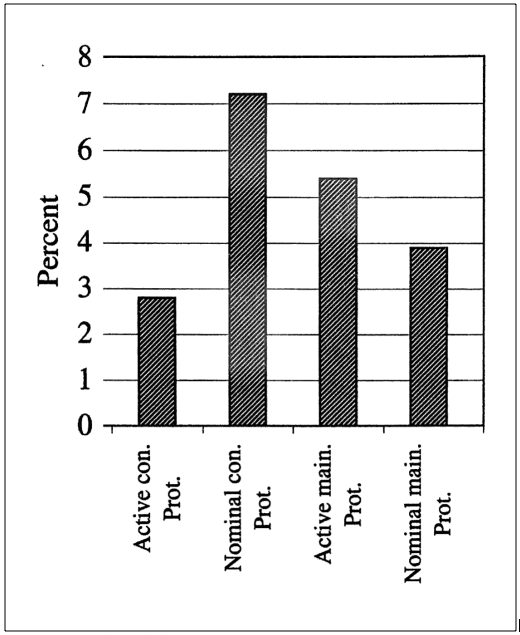Nominal Christianity—Not Complementarianism—Leads to Abuse
November 22, 2019

November 22, 2019
A Review of W. Bradford Wilcox’s Soft Patriarchs, New Men: How Christianity Shapes Fathers and Husbands. Chicago: University of Chicago Press, 2004.
In the wake of the Southern Baptist Convention’s abuse crisis, a question is being asked: Is there an essential connection between conservative theological beliefs about gender and the family to environments that foster and tolerate abuse?
An increasing number, it seems, would answer “yes.” For instance, one recent study that received attention in Christianity Today argued that Calvinist beliefs perpetuate “Domestic Violence Myths” because of their correlation with “binary views of gender,” lower levels of acceptance of social justice theory, and emphasis on hierarchical relationships. But conservative Christianity isn’t the only target. In 2017 and 2018, the Australian Broadcasting Company published a series of in-depth articles highlighting domestic violence and abuse among Evangelical, Catholic, Muslim, Jewish, and Hindu communities in Australia. Nor is this necessarily something new. Following the adoption of the BFM2000 by the Southern Baptist Convention in 1998, including the statement on male headship, two prominent journalists argued that this kind of rhetoric “can clearly lead to abuse, both physical and emotional.”
At this point, it’s helpful to turn to data and hard facts. Back in 2004, University of Virginia sociologist W. Bradford Wilcox published a monumental study, “Soft Patriarchs, New Men: How Christianity Shapes Fathers and Husbands” (University of Chicago Press, 2004). Drawing on the most comprehensive and respectable data sets available (the National Survey of Families and Households and the General Social Survey), he compares the beliefs of mainline and conservative Protestant men on marriage, gender, and the family. He then examines the effects of these beliefs on a wide-array of behaviors, including emotional attentiveness, parenting, and abuse. The usefulness of this study for the discussion on complementarianism and abuse is that, unlike Wilcox’s more recent study, it’s the only one that factors in the distinctive effect of church attendance on conservative Protestants.11 . Some have criticized Wilcox’s study for focusing only on physical abuse and neglecting other forms of abuse such as sexual, emotional, psychological, social, financial and spiritual abuse. Others have warned against over relying because the underlying data is from 1992 and therefore out of date. However, Wilcox’s study is not an anomaly among social science research on religion and abuse but rather reflects a broader trend in research that more religious men are less likely to be perpetuators of abuse and interpersonal violence.
His conclusion and findings are significant. Indeed, far from being a corollary of abuse, Wilcox finds that, when coupled with church attendance, theologically conservative views about marriage and gender actually correlate with the lowest rates of domestic violence.
In Wilcox’s words:
Contrary to the assertions of feminists, many family scholars, and public critics, [churchgoing conservative Protestant men] cannot be fairly described as “abusive” and “authoritarian” family men wedded to “stereotypical forms of masculinity.” They outpace mainline Protestant and unaffiliated family men in their emotional and practical dedication to their children and wives… and they are the least likely to physically abuse their wives. (199–200)
Indeed, by every metric, churchgoing conservative Protestant men outdo every other segment in the American population in the very areas that their critics most suspect them of wrongdoing. Wilcox found that churchgoing conservative Protestant men “spend more time with their children; they are more likely to hug and praise their children; their wives report higher levels of satisfaction with the appreciation, affection, and understanding they receive from their husbands; and they spend more time socializing with their wives” (206–207).
Again: “These family men are consistently the most active and emotionally engaged group of fathers and the most emotional engaged group of husbands in this study” (191).
Indeed, the irony that Wilcox observes again and again is that conservative Protestants with “antiquarian views” on gender and the family come closest to approximating the new “ideal man” of liberalism: gentle, emotionally-attentive, nurturing, appreciative, and kind. In Wilcox’s words, “These men take an approach to family life that comes surprisingly close to the new man ideal of active and emotionally expressive familial involvement celebrated in the society at large” (191). He continues:
Compared to their unaffiliated and mainline counterparts, conservative Protestant married men with children are consistently the most active and expressive fathers and the most emotionally engaged husbands. (195)
Most importantly, in regards to domestic violence, Wilcox drops this bombshell:
We have also seen that, contrary to the predictions of their critics, churchgoing conservative Protestant men register the lowest rates of domestic violence of any group in this study. Indeed . . . churchgoing conservative Protestant family men have the lowest rates of domestic violence of any major religious group in the United States. (207)
The significance of this finding is staggering. As it turns out, the men with the most “antiquarian” views on gender and the family actually do the best job caring for their spouses. They’re by far the least likely to abuse their wives. And even though they do less household labor, they do a better job than secular and less religious men at appreciating their wives (207).
So, far from correlating with negative behaviors and outcomes, “a conservative Protestant affiliation, especially an active affiliation, is associated with virtually every behavioral outcome analyzed in this study” (197). Mainline Protestants with more “liberal” views on the family and gender rank lower. Unaffiliated, non-religious men rank lower.
However, there’s an important flipside. While churchgoing conservative Protestant men register the lowest rates of domestic violence, it turns out that the opposite is true of nominal conservative Protestant men—that is, men who identify as “conservative Protestant” but do not attend church. Wilcox writes,
Compared to the other men in this study, [nominal conservative Protestant men] are not highly invested in the emotional and practical lives of their families, they do the least household labor, and they are the most likely to physically abuse their wives. (200)
Again, whereas, “active conservative Protestant men consistently have the highest levels of practical and emotional engagement in fatherhood and marriage,” it turns out that “nominal conservative Protestant family men are not very different from their unaffiliated counterparts when it comes to their practical and emotional investments in family life, they are not strict disciplinarians, they invest the least amount of work in household labor, and they have the highest levels of domestic violence of any group in this study” (195).
Here’s the bottom line: churchgoing conservative Protestant men rank the best at caring for their families, and nominal conservative Protestant men do the worst at caring for their wives and families. Mainline Protestant and non-religious men fall somewhere in the middle.
Beneath this is another staggering truth: conservative views on marriage and family are not sufficient in and of themselves to create healthy families and marriages. Church participation and membership make a huge difference.
Figure: Husbands who commit domestic violence | Source: NSFH2 (1992–1994)

Wilcox calls this fact “one of the most striking findings in this study” (202). In his words,
Nominal conservative Protestant family men appear to be singularly disengaged from family life—especially in comparison to their active conservative Protestant brethren. If my findings about domestic violence are any indication, these backsliding men and their female peers are probably leading the way in the types of family behaviors—divorce, marital trouble, child neglect—that conservative Protestants see as the poisonous fruits of family modernization. (202)
Indeed, so great is the behavioral gap between nominal conservative Protestant men and churchgoing conservative Protestant men that Wilcox speculates that “the distinctively poor marital behavior of nominal conservative Protestant men may account for the fact that some studies find that conservative Protestants divorce at a higher rate than the population at large” (198). In a word, nominal evangelicals are making the rest of evangelicals look bad.
Wilcox even notes that this “variance” between beliefs and practice is true of conservative Protestants in a way that is not true of mainline Protestants. Statistically speaking, “The relationship between the beliefs and behaviors of mainline Protestants and the family and gender ideologies of mainline institutions is nearer to the loose end of the continuum, while the relationship between the beliefs and behaviors of conservative Protestants and the family and gender ideologies of conservative Protestant institutions is nearer to the close end of the continuum” (194). In other words, whether or not mainline Protestant men attend church has little to no effect on their behavior. However, it makes a huge difference for conservative Protestant men.
To conclude, this study bridges the gap between two seemingly contradictory intuitions. On the one hand, as evangelicals, we believe convictionally, and many of us have experienced personally, that complementarianism is both biblical and good. On the other hand, many are sharing their stories of a complementarian theology that co-exists with and perhaps even facilitates abuse. This study gives both sets of intuitions their proper place, recognizing the inherent goodness of complementarianism when practiced by a regenerate heart, as well as its capacity for distortion when co-opted by those who are evangelical in name only.